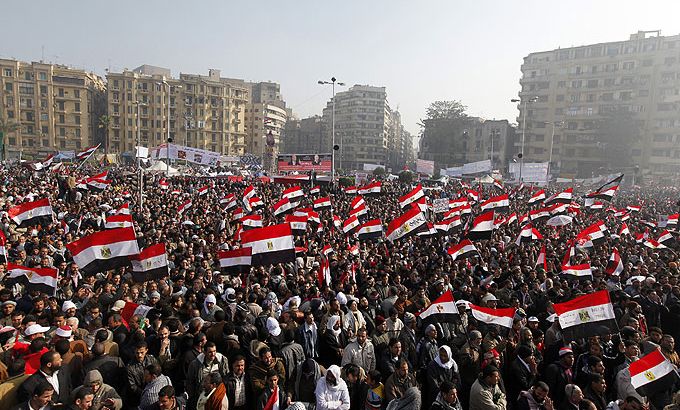Egypt marks seventh anniversary of Arab Spring uprising
As Egyptians mark seventh year since 2011 revolution, authorities seal off Tahrir Square to prevent potential protests.

Egyptian authorities have closed off routes leading to Cairo’s Tahrir Square as the country marks seven years since a revolution toppled former President Hosni Mubarak’s 30-year rule.
Thousands of Egyptians took to the streets to mark the anniversary in previous years and to protest against current President Abdel Fattah el-Sisi’s rule, but these demonstrations were quickly silenced by Egypt’s security services, resulting in civilian deaths.
Keep reading
list of 4 itemsTurkey and Egypt call for ceasefire in Gaza
Turkey’s Erdogan, Egypt’s Sisi meet in Cairo
Turkey’s Erdogan arrives in Egypt for first visit in more than a decade
The January 25 uprising that lasted for 18 days in 2011, called for democracy and an end to police brutality.
According to Amnesty International, more than 840 people were killed during the protests that took place during the revolution.
“The day of Mubarak’s stepdown, I lost my voice,” Ali Khafagi, who participated in the uprising, told Al Jazeera.
“I kept saying the people overthrew the regime, it was a dream that came true … I felt like we had something like a mini-democracy,” he added.
Abdul Rahman Feris, another demonstrator, said that it was a “dream to change the regime through a revolution”.
“We’d been protesting for years, but it was only a few dozen or 100 people,” he said. “So the regime considered us a bunch of children.”
The revolution ushered in an era of uncertainty as an already weary economy worsened and rights abuses against public dissent intensified. It brought about some change, when the country’s first democratic elections in 2012 saw the Muslim Brotherhood’s Mohammed Morsi take office.
But within a year, a military overthrow led by Sisi, deposed Morsi and banned the Muslim Brotherhood from participating in political activities.
As a result, public space in Egypt has become increasingly restrictive. Since coming to power in 2014, Sisi’s government imposed a series of punitive decisions that have been dubbed “unprecedented” by rights organisations such as Human Rights Watch.
Sisi’s government has imprisoned tens of thousands of Egyptians without charge and banned public protests by passing legislation prohibiting the gathering of 10 or more people, without prior authorisation.
In 2017, Sisi enacted a controversial law that heavily regulates the operations of 47,000 non-governmental organisations and charities across the country.
The regime also blocked access to more than 64 news websites that are not aligned with state media’s narrative. The move is said to be part of the government’s crackdown on civil society, with presidential elections scheduled to take place in March.
Sisi is now standing for re-election to serve for a second term. However, he has silenced rivals who expressed wishes to run against him in the upcoming presidential race.
A prominent Egyptian human rights lawyer, Khaled Ali, withdrew his presidential campaign on Wednesday.
Ali, an opposition leader who ran for president in 2012, faces a suspended jail term that was widely believed to hamper his ability to formally present his candidacy this year. He received a three-month jail sentence for “offending public decency” – but he says the case was “fabricated” to stop him from running.
Last week, another potential challenger for the presidency, Sami Anan, was arrested by the army after he was accused of forging documents and not seeking approval before announcing his presidential campaign.
His team announced his campaign would be suspended until further notice.
Sisi now stands as the only candidate in the race.